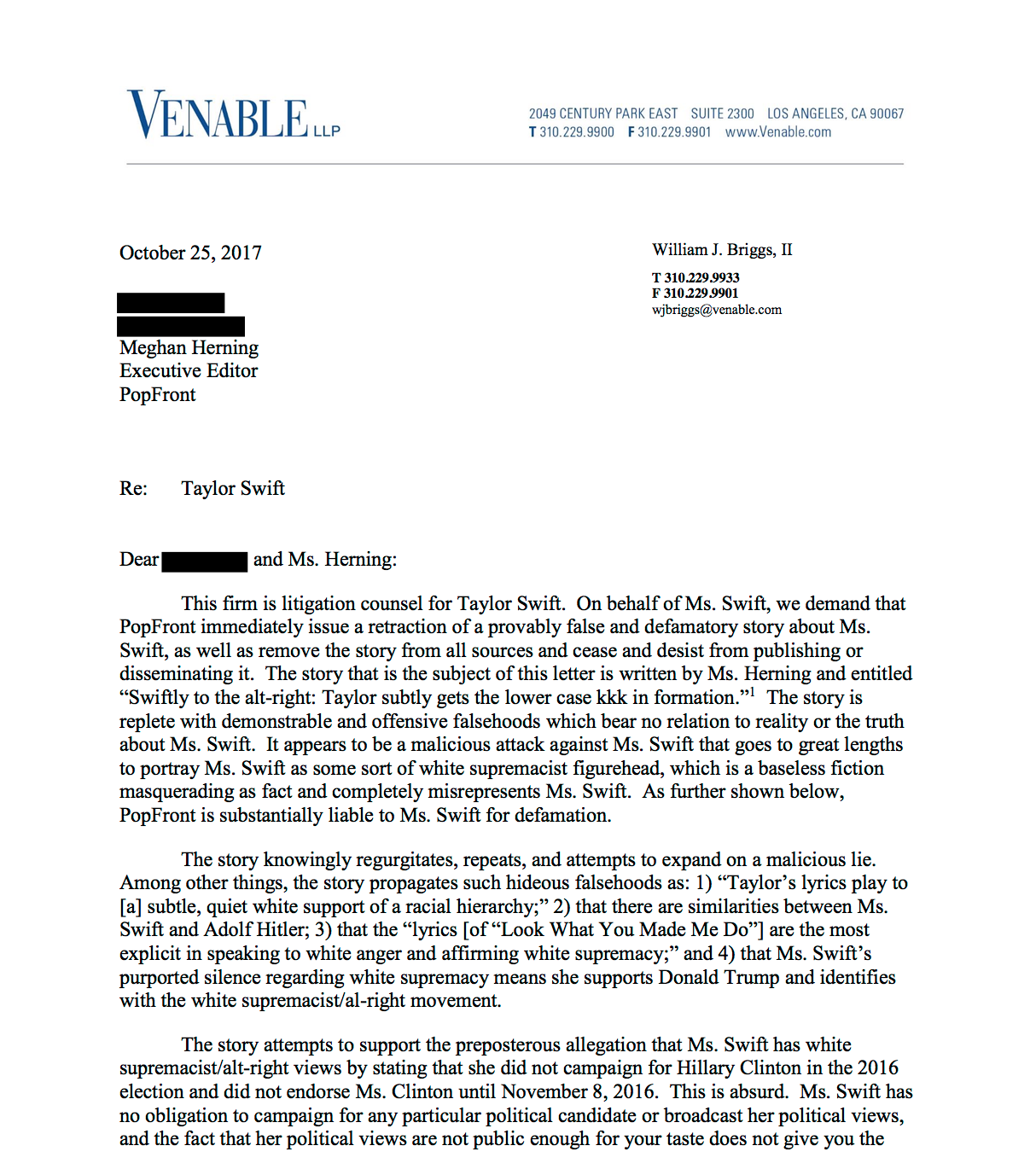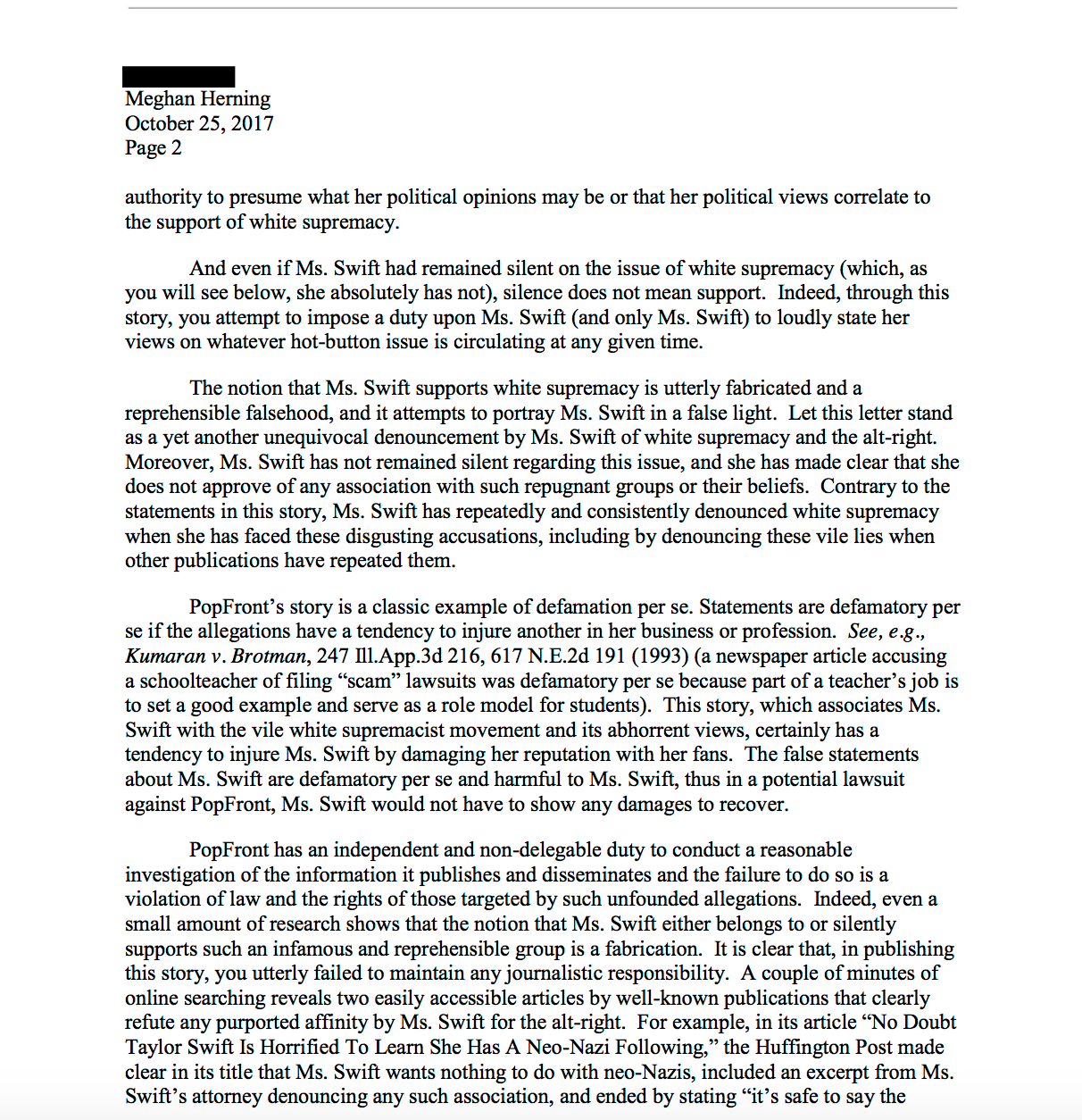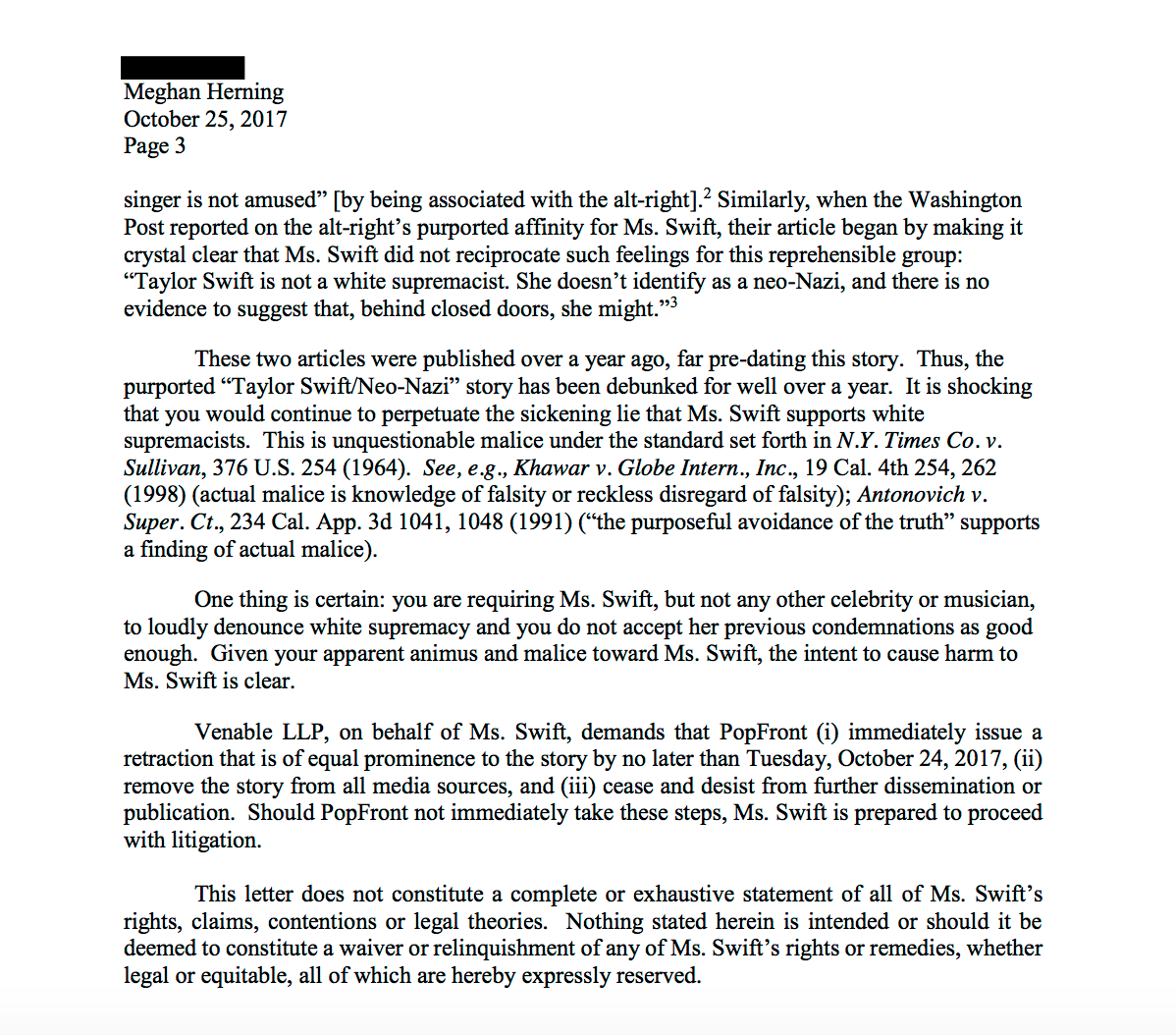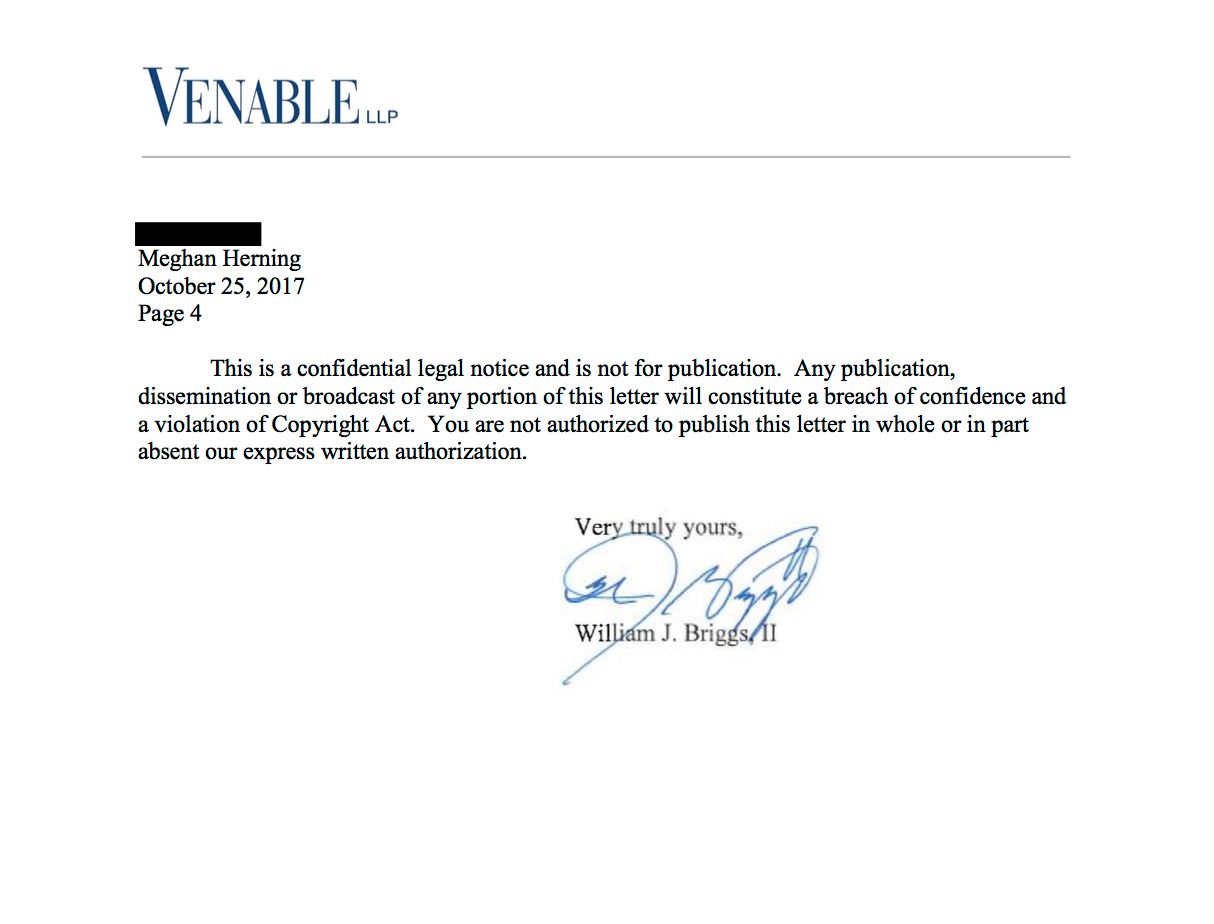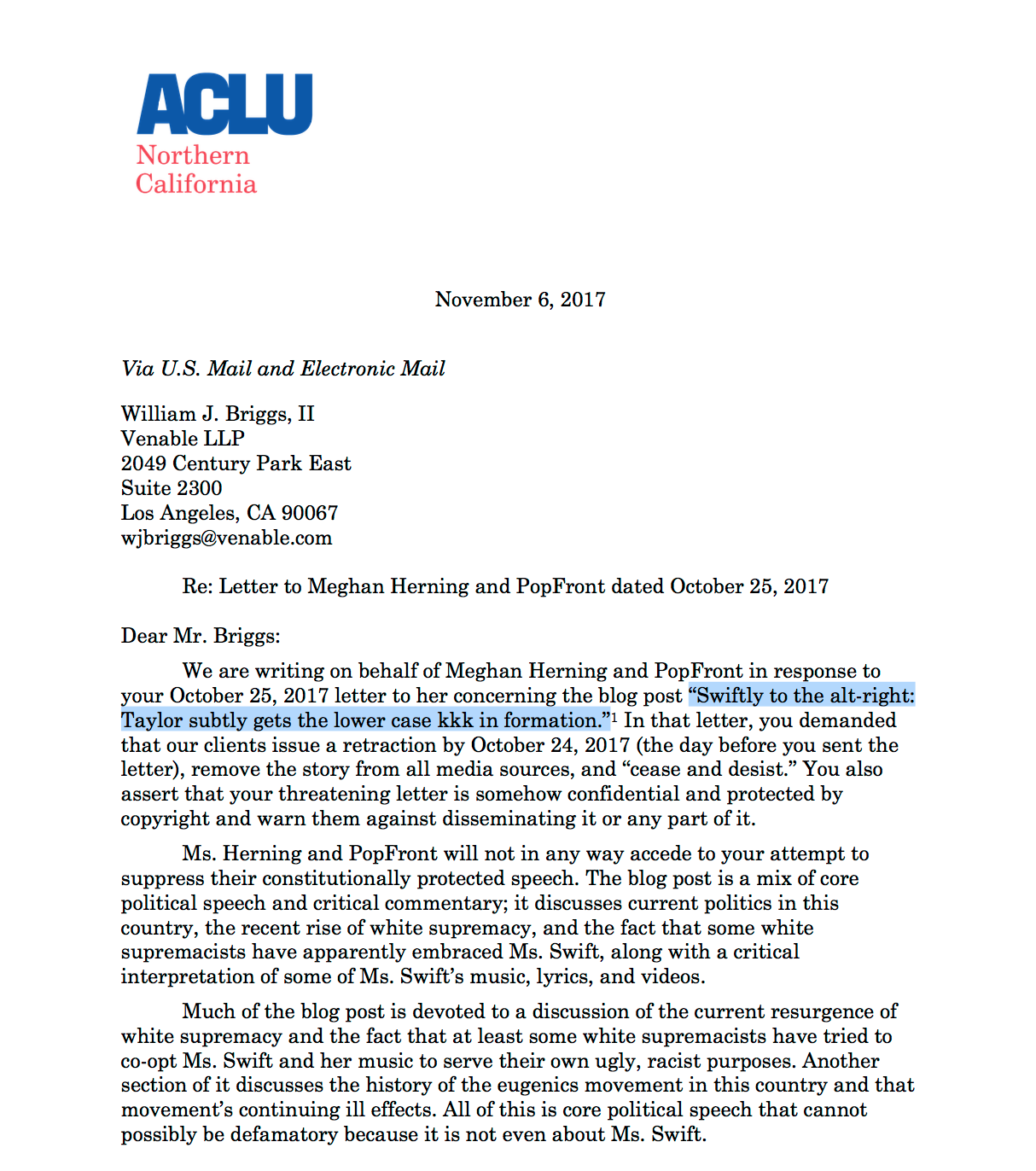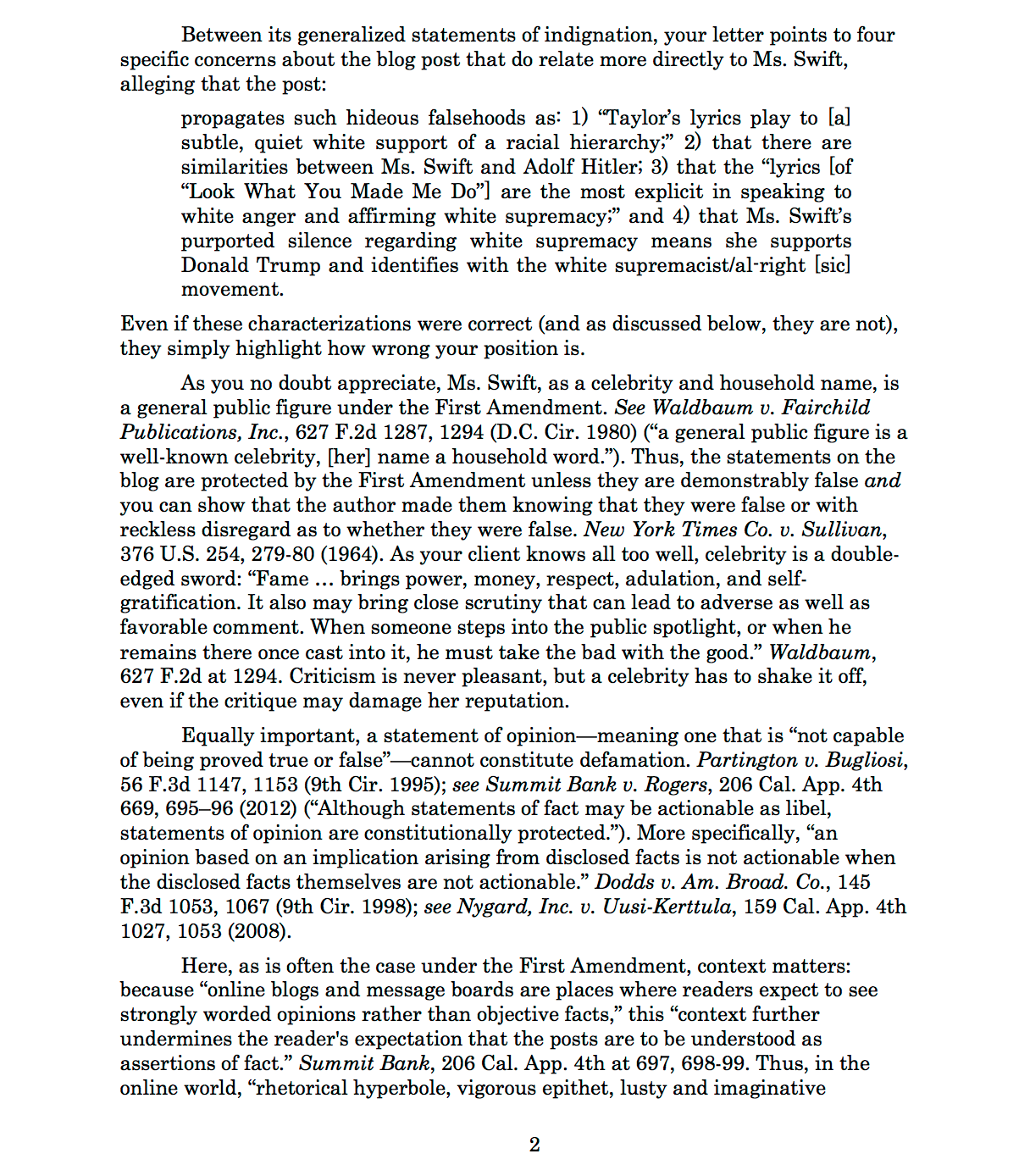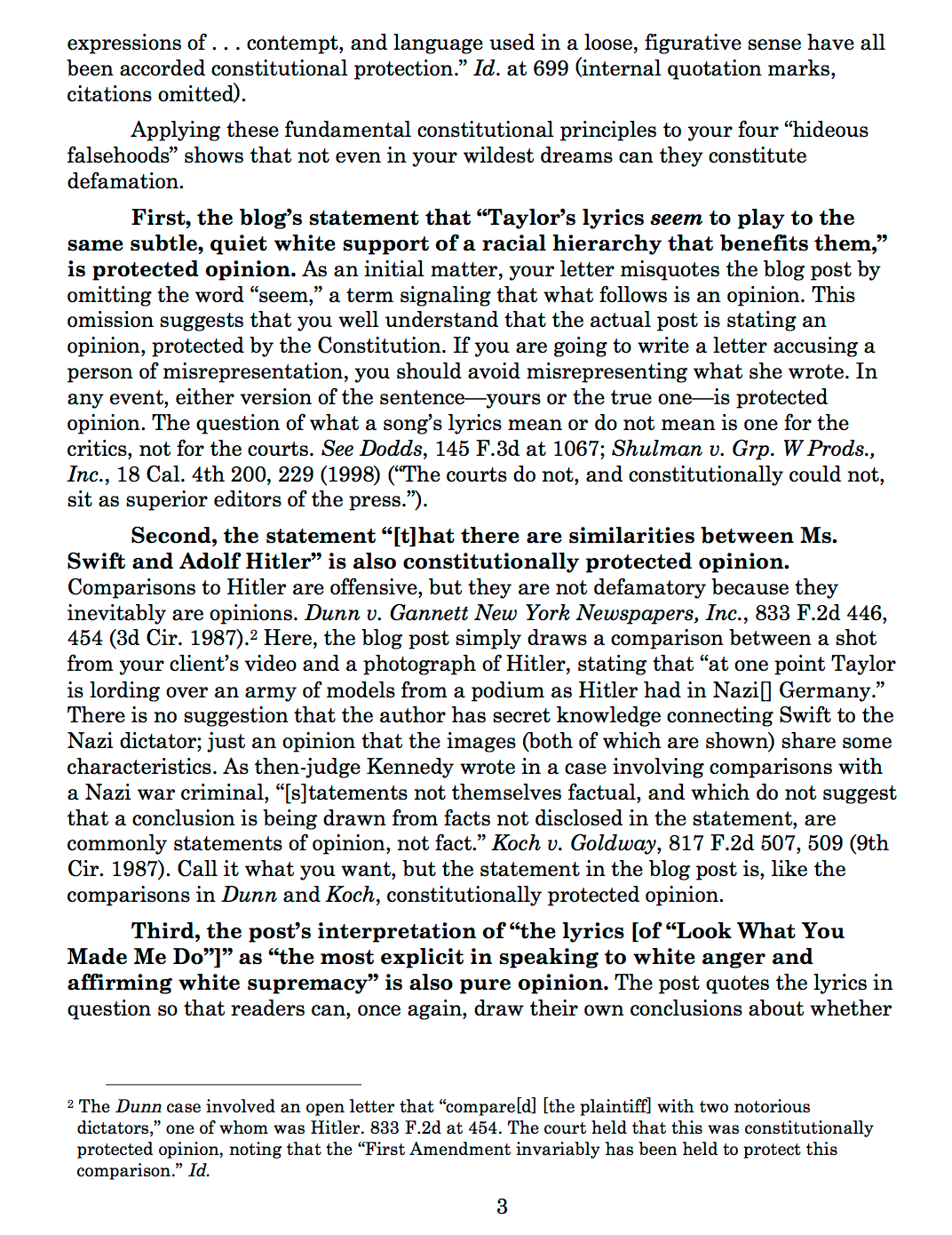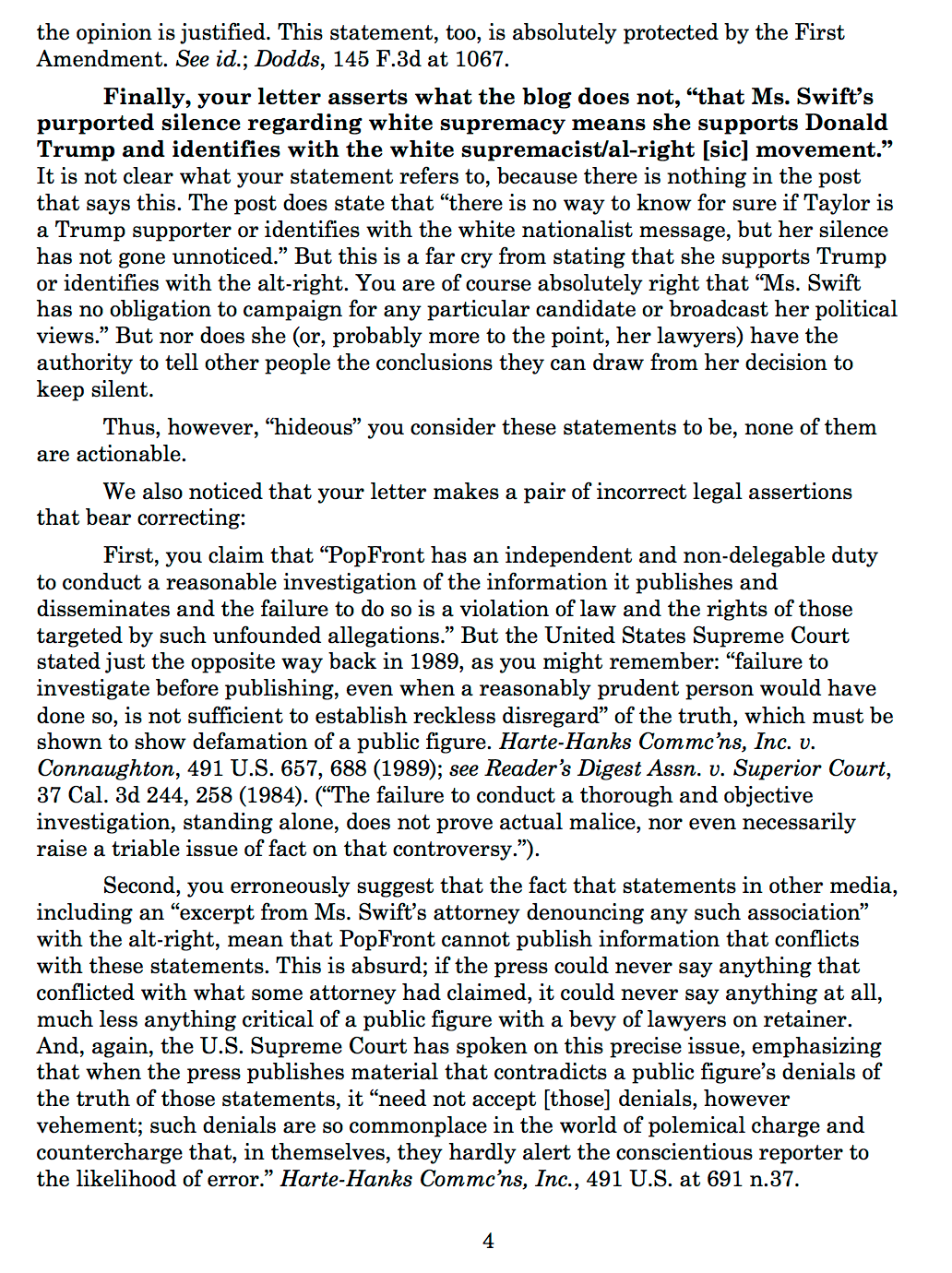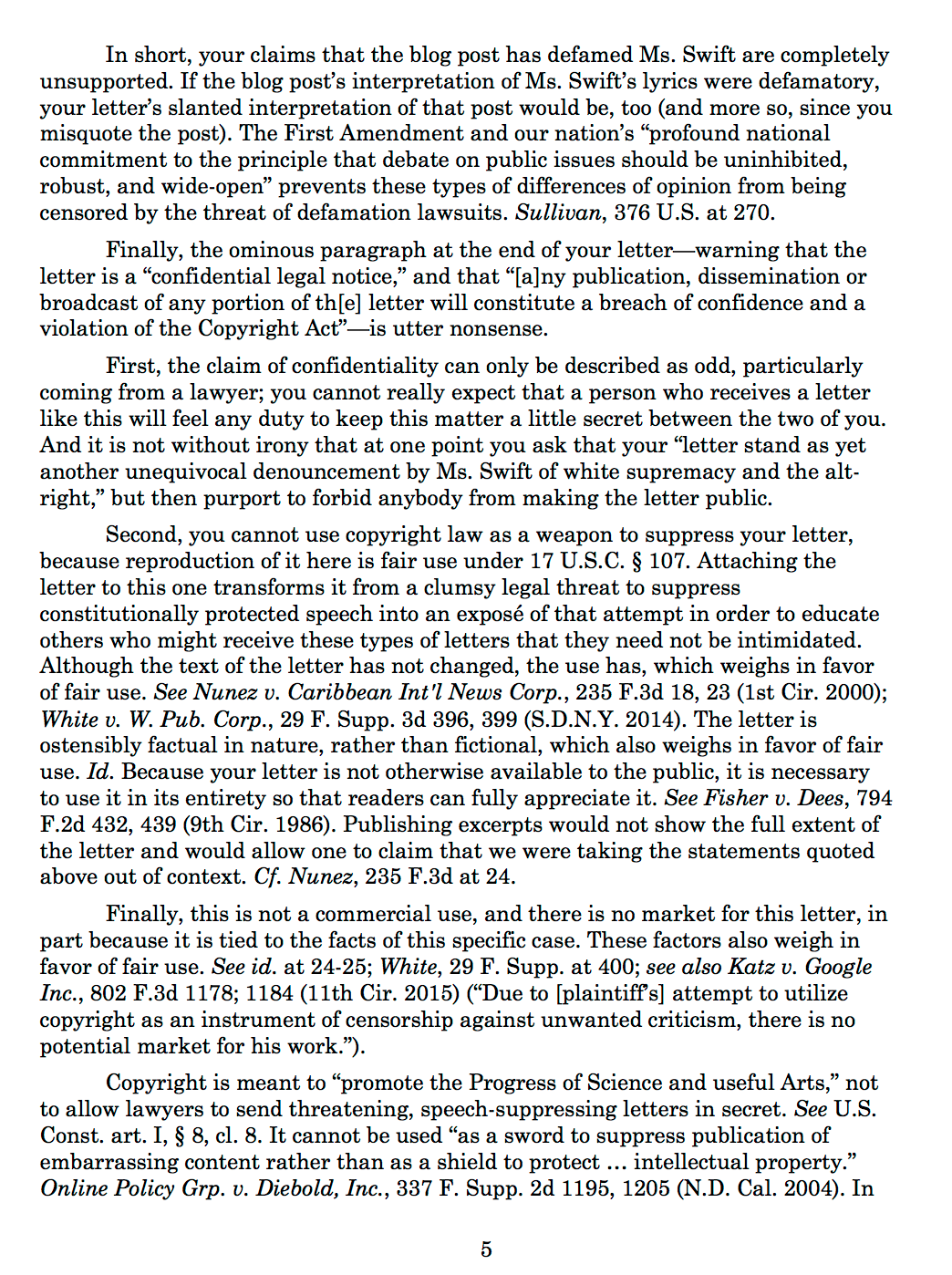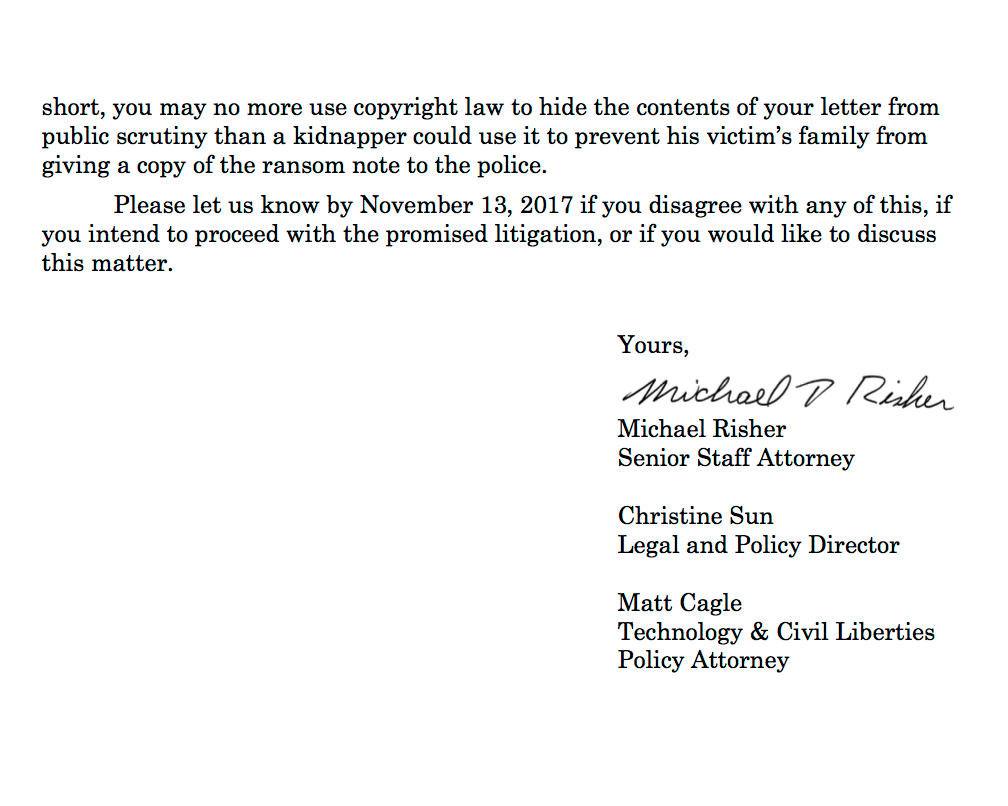
image: Vogue
Taylor Swift’s legal counsel has threatened to slap PopFront Magazine with a lawsuit for publishing an article about white supremacy and comparing the lyrics of Swift’s song “Look What You Made Me Do” and with the chants at the “Unite the Right” rally in Charlottesville, North Carolina. According to the cease and desist letter – which was sent to Meghan Herning, editor of the “online magazine about politics, culture and activism” – Swift’s counsel demanded that Herning “immediately issue a retraction of a provably false and defamatory story about Ms. Swift, as well as remove the story from all sources.”
The Cease & Desist Letter
The cease and desist letter that Herning received from Swift’s counsel alleges that the article at issue – entitled, “Swiftly to the alt-right: Taylor subtly gets the lower case kkk in formation” – “appears to be a malicious attack against Ms. Swift that goes to great lengths to portray Ms. Swift as some sort of white supremacist figurehead, which is a baseless fiction masquerading as fact and completely misrepresents Ms. Swift.”
The letter – which was signed by Venable LLP attorney William J. Briggs, II – goes on to state that Herning’s article, which was published on September 5, “knowingly regurgitates, repeats, and attempts to expand on a malicious lie.”
“Among other things,” the letter alleges that Herning’s article “propagates such hideous falsehoods as: 1) ‘Taylor’s lyrics play to a subtle, quiet white support of a racial hierarchy;’ 2) that there are similarities between Ms. Swift and Adolf Hitler; 3) that the ‘lyrics of ‘Look What You Made Me Do’ are the most explicit in speaking to white anger and affirming white supremacy;’ and 4) that Ms. Swift’s purported silence regarding white supremacy means she supports Donald Trump and identifies with the white supremacist/al-right movement.”
With such allegations – and others – in mind, Swift’s counsel demands that in order to avoid litigation, “PopFront [must] immediately issue a retraction that is of equal prominence to the story and remove the story from all media sources.”
Oh, and according to Swift’s counsel, if Herning “publishes, disseminates or broadcast of any portion of this letter,” that would constitute a breach of confidence and a violation of Copyright Act, and in theory, she would be sued for copyright infringement.
As of now, Herning’s article is still being displayed on her site.
The ACLU’s Response
Since receiving the letter on October 25, Herning took to her site to indicate that she received a cease and desist from Swift’s legal team, and stated, “Instead of publicly making a statement or publicly addressing her critics for failing to do so, Swift chose to privately employ legal threats and demand PopFront’s criticism disappear.”
“This tactic,” writes Herning, “can set a dangerous precedent because it would mean any public figure could chill any criticism levied at them.” Herning further noted that she “sought the help of the ACLU to address the demands made by Swift and her lawyer.”
As of Monday, the ACLU announced that it has “sent a letter to Taylor Swift and her attorney refuting their meritless legal defamation threats” against Herning.
Addressing the blog post at issue, the ACLU writes, “The post is a mix of political speech and critical commentary, and discusses the resurgence of white supremacy and the fact that some white supremacists have embraced Swift. It also provides a critical interpretation of some of Swift’s music, lyrics, and videos. The post ends by calling on Swift to personally denounce white supremacy, saying ‘silence in the face of injustice means support for the oppressor.’”
ACLU attorney Matt Cagle said on Monday, “Intimidation tactics like these are unacceptable. Not in her wildest dreams can Ms. Swift use copyright law to suppress this exposure of a threat to constitutionally protected speech.”
Herning said in a statement, “The press should not be bullied by high-paid lawyers or frightened into submission by legal jargon. These scare tactics may have worked for Taylor in the past, but I am not backing down.”
The ACLU has requested a response from Swift and her attorney by November 13 confirming that they will not pursue a lawsuit.
Defamation Law
For the uninitiated, defamation involves a statement of fact that is written (then it is called “libel”) or spoken (that would be “slander”) and that tends to harm another’s reputation. State law largely governs defamation, and so, the law, itself, varies depending on the state in which the case is filed.
But generally, a person bringing a defamation lawsuit must prove: (1) that a statement was published; (2) the statement is about the person bringing the suit; (3) the statement tends to harm the plaintiff’s reputation; (4) the statement is false; and (5) the statement was published with some level of fault. For public figures, such as Taylor Swift, that level of fault required in prong 5 is “actual malice.”
Actual malice merely means that the defendant (or the person who the lawsuit is filed against) published the statement about the plaintiff knowing that it was false, or published it with “reckless disregard” for whether it is true or not.
UPDATED (NOVEMBER 12, 2017): Tunrs out, Swift and her legal team opted not to respond to the ACLU’s letter. According to a statement from the ACLU’s senior staff attorney Michael Risher: “The deadline has passed and we have not heard from Ms. Swift or her attorney. Their failure to respond shows that the letter to Ms. Herning was full of empty threats and designed to intimidate. We remain concerned about threat letters of this type that effectively discourage people from seeking the legal advice they need to fight back. We encourage anyone who receives them to contact an attorney.”
